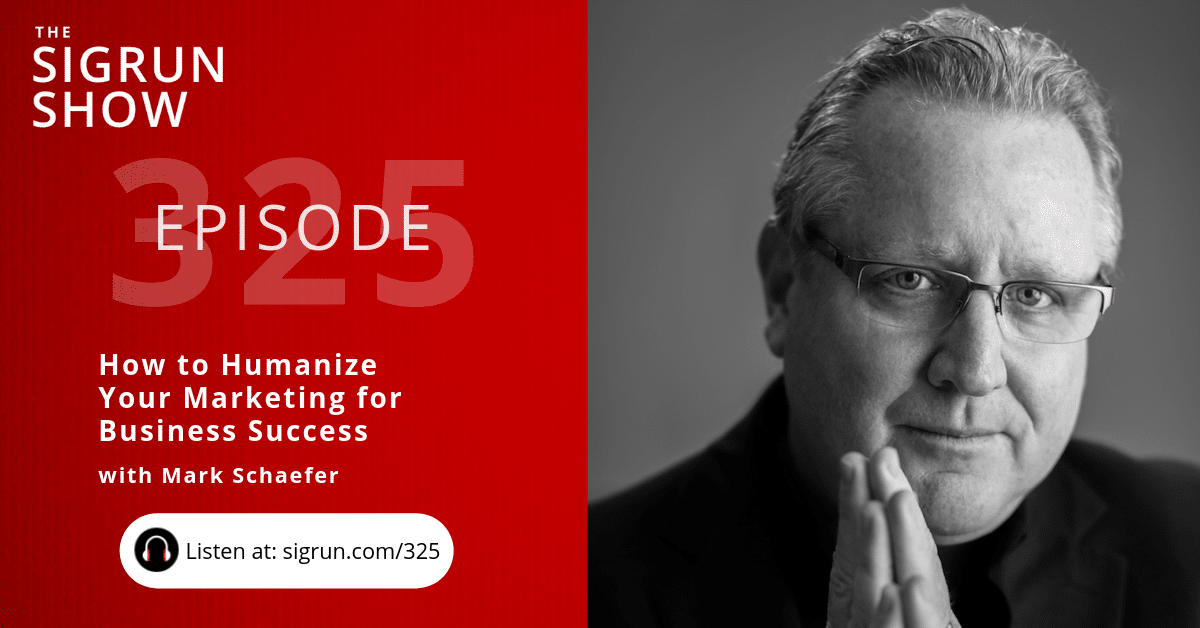
How to stick out by humanising your marketing
The amount of data that is available to companies today gives them invaluable insight into the thoughts, needs and desires of their target audience. But with all this information at their disposal, companies often forget one of the most important elements that makes up successful marketing. They forget the people behind the data.
In his new book “Marketing Rebellion”, Mark Schaefer explores this issue. Mark is an author, speaker, podcaster, business consultant and has one of the top five marketing blogs in the world. He teaches graduate marketing classes at Rutgers University and has written seven best selling books.
Our Marketing is Occurring Without Us
Before writing his book, Mark remembers that people kept telling him that they felt stuck, that they were falling behind. Their marketing efforts didn’t bring as much success as they once did. Mark’s initial theory was that technology was simply moving too fast for the companies to follow. But while he was writing, he realized that he was wrong.
“It was more than that. Technology had sort of moved away from us, but more important and more profoundly, our customers have moved away from us. I realized that all the things I had learnt in the past 30 years aren’t working anymore and I asked myself: What does it mean to be a marketer today?”
In a 2016 Accenture report, Mark read that loyalty is dead. That it’s a waste of time to spend money on loyalty.
“When I was growing up, I think it’s accurate to say that businesses did control the message. If consumers before the Internet, before social media wanted to learn about our products, interact with our company, they didn’t have any choice but to see what we were promoting, to see our marketing messaging.”
But the power has shifted. The voice and the influence have gone over to the consumer. Mark says that today, two thirds of our marketing is occurring without us.
The Three Rebellions
To understand how this shift happened, Mark defines three marketing rebellions. The rebellions all have one thing in common: At one point, the consumers didn’t accept the way things were going anymore. “I came across this story that showed how the first television remote was created in 1950 when television was just starting. It was meant for people to switch channels as soon as an ad would come on. I thought that it perfectly represented this battle that has been going on since the beginning of marketing, since the beginning of advertising, that when we do anything that interrupts, intercepts, and abuses our customers, they figure it out and they get around it.”
The End of Lies
Marketing and advertising started in the mid 1800’s in America. “Advertising back then meant making remarkable promises. When your competitors started advertising, their promises became even more remarkable, and in turn you would make yours still more remarkable until they became a lie.”
An investigative report done by a magazine showed how dangerous advertising claims could be by testing different products. Not only did the products not work, in some cases they could hurt or even kill you. “So the consumers responded. They demanded to stop being lied to. The government ended up creating laws that made it a crime to lie to customers.”
The End of Secrets
The second rebellion brought the end of secrets. “Even when I was in business, you made money on what people didn’t know. You could even have different prices for different people based on what they didn’t know. You could get away with it, because no one knew better.”
When the internet was born, all the information about companies and organizations spread down to the people. Now, a consumer wanting to buy a car, an insurance or a vacation often already had more information than the sales person. Again, the power was with the consumers.
The End of Control
This led to where we are today, the third rebellion that is the end of control. “Today, consumers are saying that they want to be respected, they don’t want to be part of a sales funnel, they don’t want to be changed and manipulated.” To satisfy their request, marketers have to come from a place of respect. “We have to give up our power and respect the power of consumers and acknowledge that they’re in control. That is really hard to do. But it’s what it’s going to take to win today.”
The amount of spam and sales calls people get today is no longer a good marketing practice. “We have to stop it.”
What consumers want today is a product that helps them belong to or believe in something. They want to be loved and acknowledged. Small businesses will have a big advantage, knowing the human needs of their clients much better than a big company. “The world today is wide open for small businesses and entrepreneurs.”
The Soap Case
Mark is convinced that all the brands that are built on advertising are eventually going to fail. “We don’t see ads anymore. I watch TV all the time, but I watch it on a streaming service like Netflix where there are no ads. I love music, but I listen to Spotify and again I don’t hear any ads. I read the news on the internet, but my ad blocker makes all advertising invisible.”
Mark was reading about how big brands are dying and advertising companies along with them because they depended on those big brands. He remembered how Procter and Gamble had produced a popular soap in the 1960ies and reached a market share of 50%. Today, it’s below 3%.
When he was at a friends house and saw a handmade soap in the bathroom, he asked his friend why she had bought it. She told him that she loved how the company was involved in the local community, how it was trying to treat its employees well and create a sustainable business, how it used honey from a farm in a neighbouring valley. “She was so passionate about the story of this company that it didn’t even matter what the product was anymore. She was moved by the people who had made it.” Her love for this brand wasn’t built on advertising impressions. It was built on human impressions.
The Attributes of the Individual
Mark says that the companies that will win in our age are the companies that are the most human. “Think about Tesla and Ford. Tesla has been around for maybe 20 years, Ford for over 100 years. But people love Elon Musk. They love his vision, they are a fan of this man. Who do you love at Ford?”
Today’s consumers want to know who is behind the product they are buying. They want to know the face and the voice and the passion. “That’s where the connection is today. It’s not on the attributes of the product. It’s on the attributes of the individual. In the book, I have lots of case studies that show that the companies that stand out today are the ones that take a stand people can believe in.”
When Mark was 19 years old, he read a phrase by Dr. Philip Kotler: “Marketing is a combination of psychology, sociology, and anthropology.” Marketing in short is made up by all things human. “But how many of us really remember that? For most of us, it’s about technology and advertising. But when you really get down to the roots of what it’s all about, it’s all things human.”
More about Mark Schaefer?
Go to businessesgrow.com for more on Mark Schaefer.
[tweetshareinline tweet=”“Psychology, sociology, anthropology – marketing is all things human.” – Mark Schaefer” username=”sigruncom”]
Resources Mentioned:
Connect with Mark Schaefer:
- BusinessesGrow.com
- Marketing Rebellion: The Most Human Company Wins
- Known: The Handbook for Building and Unleashing Your Personal Brand in the Digital Age
- The Content Code: Six Essential Strategies to Ignite Your Content, Your Marketing, and Your Business
Grab Your FREE Plan Your Profits Success Guide
Are you ready to maximize your profits as an online entrepreneur? Scaling your business and increasing your revenue doesn’t magically happen! It takes planning and strategy to make it happen. Learn how smart, savvy entrepreneurs plan their business for success with my free Plan Your Profits Success Guide.
Please share, subscribe and review on iTunes
Thank you for joining me on this episode of the Sigrun Show. If you enjoyed this episode, please share, subscribe and review on Apple Podcasts or Google Play Music so more people can enjoy the show. Don’t forget to follow and connect with me on Facebook, Twitter, and Instagram!
Learn how to leave a review, then head over to Apple Podcasts for your chance to win a special thank you gift!